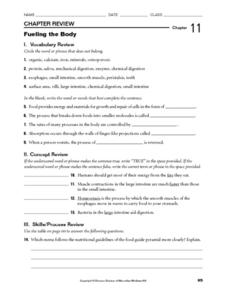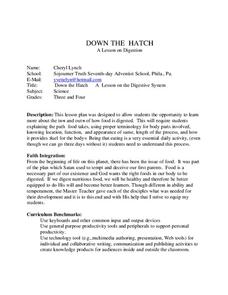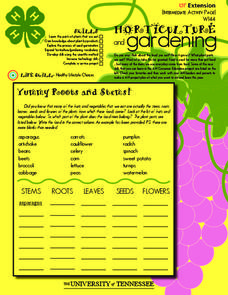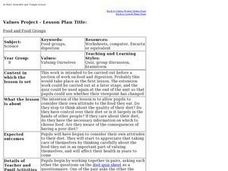Curated OER
Fueling the Body
In this nutrition worksheet, students review the organs and enzymes that are part of the digestive system. Then students review the food pyramid by comparing two menus. This worksheet has 9 fill in the blank, 4 true or false, and 5 short...
Curated OER
Down The Hatch
Students investigate how food is digested. They go through the terminology of the digestive system and follow the steps to it from beginning to end. Students use technology tools to create presentations to illustrate the functions of the...
Curated OER
Amazing Ads
In this science project worksheet, students name the product and company associated with each famous ad slogan listed. Then they survey the media to locate examples of each technique described in the boxes. Students also create a new...
Curated OER
Horticulture and Gardening
In this colorful packet, students engage in a variety of activities involving plants and seeds. After answering the 50 questions in the packet, learners can go on to delve into their own projects.
Curated OER
4-H Horticulture and Gardening- Intermediate Learner's Page
In this 4-H horticulture and gardening worksheet, students study how some of the food they eat is the stems, roots, leaves, seeds, and flowers of plants by completing a fill-in-the-blank activity and a word search page. They examine the...
Curated OER
The Barn Owl Pellet
Seventh graders examine the factors that affect the number and types of organisms that an ecosystem can support. In this ecosystem lesson students study the barn owl and where it is on the food chain, then dissect an owl pellet.
Curated OER
On The Farm
Young scholars study a dairy farm and also the crops that grow on farms. They research how we depend on farms to get the food we eat. They transform their findings and describe one the farms or make up their own. They turn the...
Curated OER
4-H Horticulture/Garden Activity Page
As part of an exploration of plants, learners engage in projects to design greenhouses, grow vegetables, and other endeavors. This 20 question activity packet could be used as a classroom mini-lesson or as the start to a long-term project.
Curated OER
How to: Build a Plant Cell
Students build a 3-dimensional model of a plant cell with household objects. In this plant biology lesson, students construct replica plant cells in groups of three. After completing their projects, students share their creations with...
Prince William Network
Migration Headache
During this game, kids become migratory shorebirds and fly among wintering, nesting, and stopover habitats. If they do not arrive at a suitable habitat on time, they do not survive. Catastrophic events are periodically introduced that...
Education Outside
Honey Tasting
Young scientists will be abuzz as they sample and compare the tasty treats produced by Apis Mellifera.
Organic Farming
Four Seasons
Celebrate the changing of the seasons with this collection of arts and crafts activities.
Learning Games Lab
Bacteria Sampling
Scholars explore the procedure for bacteria sampling in a virtual lab by first walking through a detailed step-by-step procedure of preparing the samples of raw milk and pasteurized milk, growing the bacteria, and comparing results....
SF Environment
Pre-School Composting and Recycling!
You can never be too young to get involved in composting or recycling. Here is a lesson that has been made for the very littlest learners and it's all about the importance of conservation. They'll sort compostable and recyclable objects,...
NOAA
Fishy Deep-sea Designs!
Oceans represent more than 80 percent of all habitats, yet we know less about them than most other habitats on the planet. The instructor introduces the epipelagic, mesopelagic, bathypelagic, twilight, and midnight zones in the ocean....
Science 4 Inquiry
The Ups and Downs of Populations
As the reality of population decline across many species becomes real, pupils learn about the variables related to changes in populations. They complete a simulation of population changes and graph the results, then discuss limiting...
Melissa Institute for Violence Prevention and Treatment
Concept Muraling
Concept muraling helps learners improve their comprehension of a text by giving them a way to organize their understanding of the key concepts in that text. Introduce readers to this process with a carefully scaffolded lesson plan that...
United Nations
Compost Monitor Training
What should go in the trash, and what can be composted? Guide your young conservationists through the process of composing their trash with a lesson about the different ways we can dispose of garbage. Using a trash bag with clean...
Garden Earth Naturalist Club
Parts of a Flower! Flower Dissection
Sometimes the best way to learn about plants is to see the different parts of a plant yourself. Groups of learners dissect flowers to answer questions about what they observe and what they wonder about their flower.
American Museum of Natural History
Dive Into Worlds Within the Sea
Make connections between ocean organisms. Individuals explore three different ecosystems in the ocean. With an online interactive, they learn how different organisms depend upon each other. Learners first answer questions to connect...
Curated OER
Introduction to Worm Bin Project
Students observe the decomposing process of the food chain in a worm bin. They observe whether the type of food fed to worms affect the castings given off during the decomposition process. They learn and practice graphing their findings.
Curated OER
Worm Bin Project Data Exchange
Students work collaboratively to exchange data with their peers (groups of students at other schools) about their worm bin project. They discuss differing findings and hypothesize reasons for these differences.
Curated OER
Food and Food Groups
Eighth graders research the importance of diet and its relationship to disease. They examine their own attitudes about the foods they eat.
Curated OER
Mission: Project Rescue
Third graders explore animals and their habitats. Using the Internet, they gather information and determine which animal goes into which habitat. Students design travel containers to provide proper food, water and comforts for the animal.
Other popular searches
- Science Project Food Apples
- Science Project Food Chain
- Science Project Food Waste
- Science Project Food Rice
- Food Science Fair Projects
- Science Project Food Decay
- Science Projects Food Chain

























